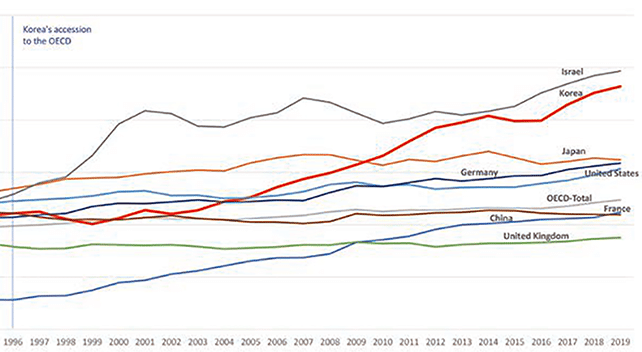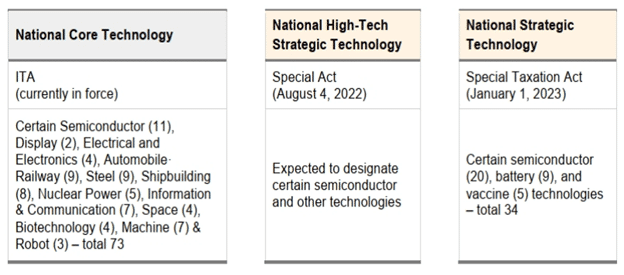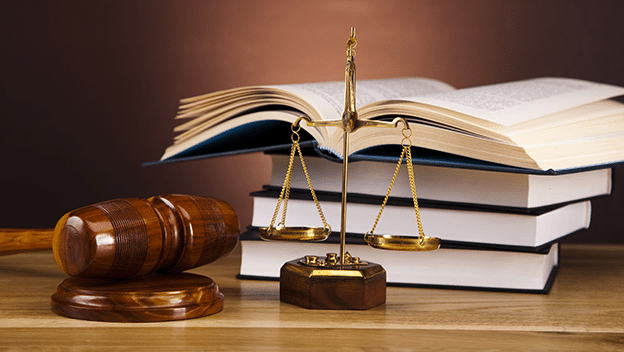South Korea’s Technology Protection Strategy of National Core Technologies

Handling Audio and Video Files to Meet eDiscovery Requirements
October 12, 2023
AI and GenAI in LegalTech
March 28, 2024
Global technology competition has grown fierce recently requiring nations to consider and enact technology protection policies and strategies. In Japan, for example, there was a significant change in 2014 under the Liberal Democratic Party that led to the development and passage of the Economic Security Promotion Act in 2022, along with a new National Security Strategy. Similarly, in South Korea – the focus of this article – the government has long endeavored to become a global powerhouse in science and technology, and today is considered a leading player in several industries and one of the most advanced digital economies in the world.
FRONTEO is often consulted for insight regarding data privacy and protection laws as they pertain to Asian-Pacific countries due to our deep experience in the region. As a result, we decided to publish this blog to provide some insight into South Korea’s evolution as a global technology leader, which is important context to further understand the significance Korea currently places on its unique protection strategy of national core technologies.
Growth of Science & Technology in South Korea
The development of modern science and technology began in South Korea in the 1960s. By 1967, the Korean government had established the Ministry of Science and Technology (MOST), which by the mid-1980s had steered Korea from a developing country to the threshold of an advanced country. In 1987, the launch of the Industrial Generic Technology Development Programme, which facilitated financial and technological assistance to private firms for developing critical high-risk technologies, firmly put Korea on its path towards the development of high technology.
As a result, private firms started focusing on performing R&D in-house to reduce Korea’s overall dependence on imported technologies. R&D spending advanced from 0.77% of GDP in 1980 to 2.33% in 1994, which at the time placed Korea on par with other advanced OECD economies (Organisation for Economic Co-operation and Development). By 2019, R&D spending – most of which was focused on experimental development – had reached a level of twice the OECD average as noted in the below figure:

Korea’s “Act On Prevention of Divulgence and Protection of Industrial Technology” & National Core Technologies List
South Korea’s meteoric rise as a global technology power, as represented in the above chart, understandably drew government concern of international technology theft or leakage, culminating in the passage of Korea’s Act On Prevention of Divulgence and Protection of Industrial Technology in 2011. The purpose of this Act was to prevent undue divulgence of technology, strengthen the competitiveness of Korean industries, and aid Korea’s national security and development of its economy. Additionally, this Act established Korea’s National Core Technology list (NCT), which included designated technology that, if leaked or stolen, could have a detrimental effect on the economy and national security.
Currently, two Korean statutes govern the outflow/export of technology:
- The Foreign Trade Law ("FTL") which regulates "Strategic Technology" controlled under multinational strategic materials export control regimes, such as the Wassenaar Arrangement, the Nuclear Suppliers Group, etc.
- The Act on Prevention of Leakage and Protection of Industrial Technology ("ITA"), which regulates National Core Technologies.
The Ministry of Industry, Trade and Energy ("MOTIE") is the primary government agency responsible for administering both laws and reviewing all requests from NCT exporters to:
(i) receive export approval if the related technology was the result of R&D supported by government funding, or
(ii) declare the export if technology was the result of R&D without government funding.
If an NCT subject to export approval or declaration is improperly exported (e.g., without required approval; via incorrect procedures; without export declaration; using a false declaration, etc.), MOTIE may suspend or prohibit the export, or order "restoration to the original state" (e.g., revoking export contract). Violators of the ITA could be subject to criminal prosecution with a maximum penalty of 15 years in prison or KRW 1.5 billion (approximately USD 1,150,000) in fines. This Act is precisely why it is critical for legal teams that manage matters with data originating or residing in Korea to refer to the current NCT list and take necessary precautions to confirm full compliance with Korea’s export control laws.
Korea Revises Its Technology Protection Strategy
The Korean government’s approach to safeguarding national core technologies has evolved in response to technological advancements and trends since 2011. Most recently, Korea has decided to take a more proactive approach in remaking its policy framework in support of a revised set of global technology protection policies.
On December 23, 2021, the Korean government announced its Technology Protection Strategy under Global Competition for Technology Hegemony ("Protection Strategy"), recognizing the growing importance to its economy and national security of securing core technologies and supply chain infrastructure. According to the Protection Strategy, the government will seek to integrate various protection measures previously established and implemented by different government ministries into a single unified "Korean technology protection strategy." This strategy signals the government's commitment to mobilize its ministries preemptively and strategically in response to unlawful attempts at accessing Korea's core technologies.
The Protection Strategy aims to strengthen the competitiveness of Korean industries through ITA amendments proposals that contain key objectives such as:
- Establishment of a proactive protection system for core technologies that will:
a) ExpaExpand new designations of core technologies and implement a "sunset" system to revoke prior designations.
b) Introduce a system for registering institutions possessing National Core Technology to prevent unauthorized export of technologies, unapproved M&As by foreign entities, evasion of NCT declaration, and failures to undergo compliance audits.
c) Expand the scope of application to include M&As involving foreign companies to prevent technology theft.
- Retain key personnel and establish a virtuous cycle of human resources. To prevent leakage of National Core Technology experts and technology the government plans to:
a) Establish a database of National Core Technology experts;
b) Encourage and incentivize the long-term service of core personnel; and
c) Establish measures to prevent the exploitation of technology by foreign experts.
- Strengthen cooperation among ministries and cooperation for international trade in technology by:
a) Establishing a center for reporting leakage and infringement;
b) Jointly announcing mid- and long-term technology protection plans for each ministry; and
c) Comprehensively improving cooperation for technology trade across semiconductor, investment assessment, ICT, energy, and other fields, in accordance with the Korea-U.S. Summit Agreement.
Due to intensifying global competition for technology control, and the Korean government’s steadfast commitment to prevent leakage of core Korean technologies, companies that handle designated core technologies in Korea are strongly advised to monitor amendments to relevant laws and regulations (e.g., export control laws).
In addition to these amendment proposals, a new Act on Special Measures for Strengthening and Protecting the Competitiveness of the National High-Tech Strategic Industry ("Special Act") took effect on August 4, 2022. Under this Special Act, specific technologies will be newly designated and protected as "National High-Tech Strategic Technology” if they:
(i) have a significant impact on national and economic security;
(ii) have growth potential, technical difficulty and industrial importance, and
(iii) have a significant ripple effect on related industries,
The government will provide a package of support to companies that provide products or services based on National High-Tech Strategy Technology, or industries that research, develop or commercialize National High-Tech Strategic Technologies, which will include expedited processing of governmental approvals or licenses, priority support for industrial infrastructure, rapid processing of administrative complaints, funding and tax benefits.
Tax benefits under the Special Act are linked to the amended Restriction of Special Taxation Act ("Special Taxation Act") that took effect on January 1, 2023. Under the Special Taxation Act, certain technologies were newly designated as "National Strategic Technology," and will yield tax benefits to their corresponding companies. Below is a chart with high-level details that illustrate the impact all current policies have on Korea’s National Core Technologies.

One important item to note is that any technology designated “National High-Tech Strategic Technology” will fall under the ITA, so any related export or M&A involving a company possessing National High-Tech Strategic Technology must also require approval by the Minister of Trade, Industry and Energy (MOTIE).
Korea Pledges to Secure Super Gap Technologies
Korea’s robust NCT protection strategy has equipped the country with the necessary security to confidently increase investments toward securing “super gap” technologies, which are technologies Korea anticipates will demand resources and attention in the rapidly changing global technological landscape.
This past April, the Ministry of Science and ICT announced that Korea will invest 160 trillion won ($121 billion) through 2027 to secure core technologies in the country’s three major sectors – semiconductor, display and battery – that will be funded by public and private sectors to spur R&D across all three disciplines. Science Minister, Lee Jong-ho, further noted “the semiconductor, display and next-generation battery sectors are supporting technologies that have stably backed our economy based on the super capabilities of the private sector.”Prior investment efforts into Korea’s technology sector lacked continuous support for R&D investment due to segmented processes and indistinct leadership. To overcome such issues, the government will require public and private sectors to collaboratively form a consultative body that will cover the entire R&D cycle from beginning to end. These consultative bodies will consist of government and industry officials, as well as experts from academia.
The government selected 100 core technologies in the fields of chips, display and battery to offer preemptive support explaining it is crucial to foresee which technologies will control the global market. The government also committed to reviewing and revising this list of core technologies on a yearly basis.
For some metrics that underscore the significance of Korea’s newly implemented strategy, chip and display exports accounted for 23 percent of Korea’s total exports in 2021. Furthermore, the global secondary battery market is expected to increase to $351.7 billion in 2030, about eight times larger than that of 2020. Science Minister, Lee Jong-ho, further noted that Korea “will continue to strengthen R&D investment through cooperation between the public and private sectors to secure the world's No. 1 technology in the three major technologies with a winner-take-all structure.”
Korea’s Super Gap Initiative Expands – Super Gap Startup 1000+ Tech Conference
In 2023, Korea was very active in implementing the final pieces of its revised Technology Protection Strategy.
One recent event that Korea’s technology-driven policies facilitated includes a “Super Gap Startup 1000+ Tech Conference”, which was a two-day event that ended on December 1st and covered 10 new industries designated by the government: system semiconductors, bio/health, mobility, green technology and energy, robotics, big data and AI, cybersecurity and networks, aerospace and marine, next-generation nuclear power plants, and quantum technology.
This project, which was created to nurture over 1,000 startups in these fields, will be funded by more than 2 trillion won over the next five years by a joint public & private venture.
Conclusion
Korea is among the most advanced economies in the world and is a global leader in the fields of science, technology, innovation and industry. Korea’s recent policies and initiatives, as covered in this blog, serve to highlight the country’s intent to further secure its intellectual property in order to facilitate innovation and maintain Korea’s status as a global technology leader.
Given South Korea’s unrelenting focus on maintaining tight control over the safekeeping and transportation of data as it relates to Korea’s NCT list, it is critical that legal teams recognize current laws and regulations that govern the handling of data as it pertains to eDiscovery or litigation matters, and understand their responsibilities and requirements toward collecting, hosting, transmitting and subsequently deleting all data under Korea’s purview.
Should you have any questions, concerns or comments, or would like to discuss a current or future matter that may include Korean data, please do not hesitate to reach out to us below and a member of our global FRONTEO team will gladly provide assistance.
Sources:
-
National Core Technology List Updated
https://www.kimchang.com/newsletter/2017newsletter/ip/eng/newsletter_ip_en_spring_summer2017_article05.html -
A Global Powerhouse in Science and Technology
https://www.oecd.org/country/korea/thematic-focus/a-global-powerhouse-in-science-and-technology-61cbd1ad/ -
Korea Announces Comprehensive "Technology Protection Strategy" for Core Technologies and Infrastructure
https://www.ip.kimchang.com/en/insights/detail.kc?sch_section=4&idx=24577 -
W160tr pledged to secure 'super gap' technologies
https://www.koreaherald.com/view.php?ud=20230406000676 -
TiumBio, a Biotech Company Gets Selected as One of Outstanding Startups at the Super Gap Startup 1000+ Tech Conference
https://tech.einnews.com/pr_news/673265879/tiumbio-a-biotech-company-gets-selected-as-one-of-outstanding-startups-at-the-super-gap-startup-1000-tech-Conference#:~:text=The%20Super%20Gap%20Startup%201000%2B%20project%20covers%2010%20new%20industries,power%20plants%2C%20and%20quantum%20technology
近年世界的な技術競争が激化しており、各国は技術保護の政策や戦略の検討、制定が求められています。科学や技術などにおいて世界をリードする韓国は、重要な指定技術が含まれる国家基幹技術リスト(NCT)を制定、これを含む盗用や流出に関する法律を成立させるなどの対策が取られています。韓国ではこのような重要データの管理に重点を置いていることから、関連する企業の法務チームはeDiscoveryや訴訟問題に関する法律および規制を理解し、管理の責任を理解することが必要不可欠です。FRONTEOはデータ取り扱いや訴訟等に関するアジア太平洋地域での深い経験と知識を持って、複雑な韓国データの取り扱い含むケースをサポートいたします。



